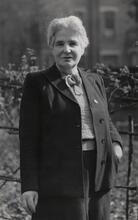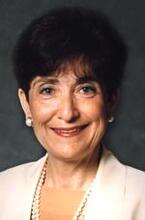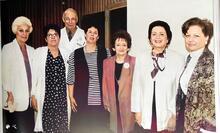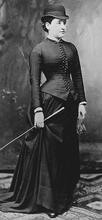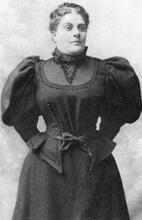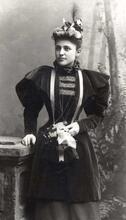Emma B. Mandl
Emma B. Mandl created and led vital institutions for Jewish East European immigrants in Chicago, from orphanages to trade schools to tuberculosis wards. Mandl immigrated to the US at age fifteen and helped found the Baron Hirsch Women’s Club, a major Chicago philanthropic organization, in 1889. She eventually served as its president for fourteen years and was then named honorary president. Through the club, Mandl organized and led a number of service groups, including Chicago’s first Jewish orphanage in 1894, a halfway house called the Home for Jewish Friendless and Working Girls, a trade school and social services network called the Ruth Club, the Chicago Winfield Tuberculosis Sanitarium, and the Home for Convalescent Men and Boys. The activist Jane Addams was a pallbearer at her funeral.
In the Chicago world of humanitarian endeavor her name stands forth as that of a woman of strong personality, of keen powers of observation and of high attainment. She seldom speaks in public or claims credit for the institutions founded by her, yet for nearly twenty-five years she has devoted her life to various benefactions.
These words are part of a biographical sketch of Emma B. Mandl that appeared in the 1914 edition of Leading Women in Social Service.
Family & Personal Life
The daughter of Jonas and Charlotte (Goldscheider) Adler, Emma Adler Mandl was born on December 16, 1842, in Pilsen, Bohemia. At the time of her death in 1928, she was survived by a brother, George. It is unknown whether she had any other siblings. She was educated in Pilsen and immigrated to the United States with her family at age fifteen. During the last 69 years of her life, she lived in Chicago. She married Bernhard Mandl on November 26, 1865; they had two children, Sidney (b. 1868) and Etta (Mrs. Sol Klein) (b. 1870).
Baron Hirsch Woman’s Club
For approximately 40 years, Mandl was devoted to organizing and founding numerous charitable organizations in Chicago. The vast majority of these philanthropic groups were established by prominent German Jewish women, in response to the growing need to provide social services for the influx of Eastern European Jews to Chicago. These institutions eventually became part of the United Hebrew Charities, the precursor organization to the Jewish Federation of Metropolitan Chicago.
Mandl was one of the founders of the Baron Hirsch Woman’s Club in 1889. By 1918, according to The Chicago Jewish Community Blue Book of that year, the club was the largest philanthropic organization, irrespective of denomination, in Illinois. Mandl was president of the group for fourteen years, and then was made honorary president. The Baron Hirsch Woman’s Club was the mother organization for a variety of service groups that all owed their founding and leadership to Mandl. These offspring organizations included the Home for Jewish Orphans (founded in 1894), the Chicago Home for Jewish Friendless and Working Girls (1901), the Ruth Club (1905), the Jewish Home Finding Society (1907), the Chicago Winfield Tuberculosis Sanitarium (1909), the Baron Hirsch Co-Workers (1910), and the Home for Convalescent Men and Boys (1915).
Work with Orphans and Young Working Women
The Woman’s Club motto was “In faith and hope the world will disagree, but all mankind’s concern is charity.” Its members strove to reach out to the needy in a multitude of ways. For example, prior to the establishment of the Home for Jewish Orphans, Chicago orphans were sent to an orphanage in Cleveland that had been set up by the Chicago B’nai B’rith in 1868. After decades of controversy, the Home for Jewish Orphans was founded to provide for the needs of the Chicago Jewish community. Mandl was given the title of honorary director for the contributions she made to this home.
As the founder and first president of the Home for Jewish Friendless and Working Girls, Mandl created an institution that provided an intermediary home for children before they were placed in the Home for Jewish Orphans or returned to a guardian. The home also supplied living quarters for girls and young women who did not have proper homes.
The founding of the Ruth Club was precipitated by the need for a separate institution to serve the needs of young, self-supporting working women. Mandl was instrumental in establishing an independent home with an appropriate environment for working women and for those wanting to learn a trade. The Baron Hirsch Woman’s Club had an educational fund that covered the costs of lodging and education until these young women became self-supporting.
The Jewish Home Finding Society reunited children who had been placed in the orphanage with their mothers. The society also started a mothers’ pension program and became a foster family agency providing supplemental funds to foster families. Society workers lobbied for increased funding from the state for foster families.
Later Philanthropic Career
When a deadly outbreak of tuberculosis hit Chicago, Mandl spearheaded the formation of the Chicago Winfield Tuberculosis Sanitarium and, later, the Home for Convalescent Men and Boys. The latter institution founded Rest Cottage, a long-term health care facility for people recovering from heart disease and other debilitating illnesses.
Mandl was a director of Deborah Verein, a charter member of Sarah Greenebaum Lodge No. 15, a member of the Chicago Association of Jewish Women, and the first vice president of the Illinois Federation of Women’s Clubs, Second District. In addition, she was a director of the Bureau of Personal Service and a probation officer for the Juvenile Court of Chicago. Not surprisingly, she also favored woman suffrage.
Emma B. Mandl died in Chicago on July 31, 1928. Her altruistic work within Chicago’s Jewish community is her lasting legacy.
AJYB 7 (1905–1906): 86, 31 (1929–1930): 93.
“The Chicago Jewess.” Reform Advocate, January 30, 1909, 725–729.
The Chicago Jewish Community Blue Book. Chicago: The Sentinel Publishing Company, 1918.
Meites, Hyman L., ed. History of the Jews of Chicago. Chicago: Jewish Historical Society of Illinois,1924. Reprinted 1990.
Obituary. Reform Advocate, August 4, 1928.
The Sentinel’s History of Chicago Jewry 1911–1986. Chicago: The Sentinel Publishing Company, 1986.
Stein, Oswald. Leading Women in Social Service. Chicago: A.C. McClurg Company, 1914.
UJE.
Woman’s Who’s Who of America: A Biographical Dictionary of Contemporary Women of the United States and Canada, 1914–1915. Edited by John William Leonard. New York: American Commonwealth Co., 1914. Reprinted 1976.

